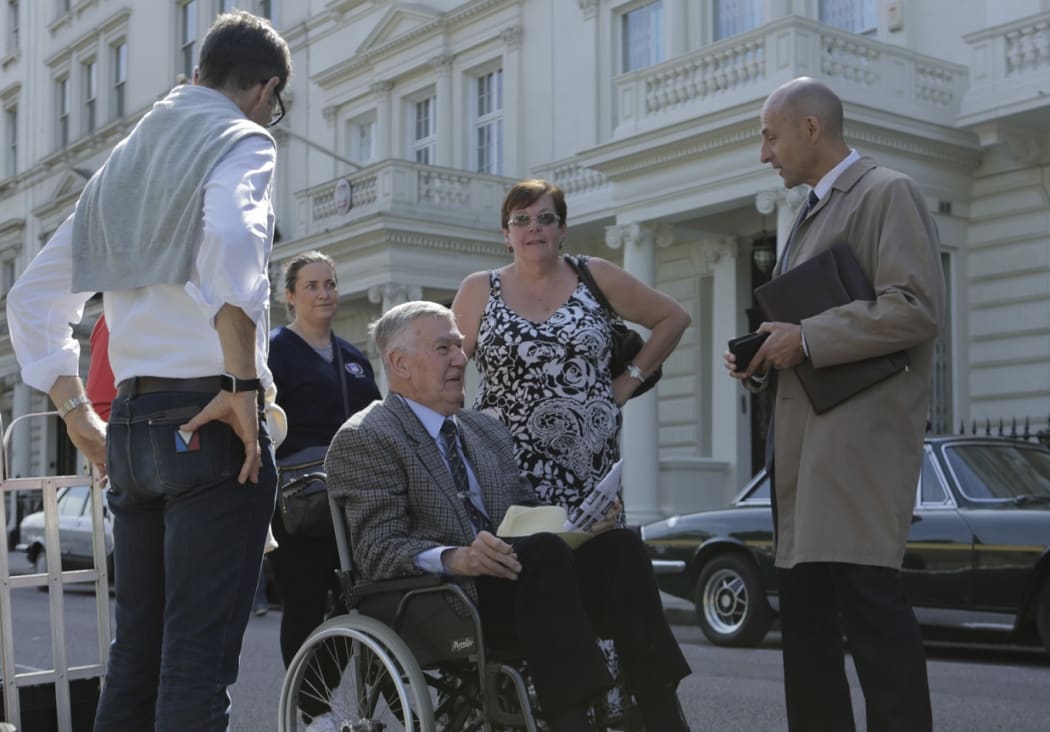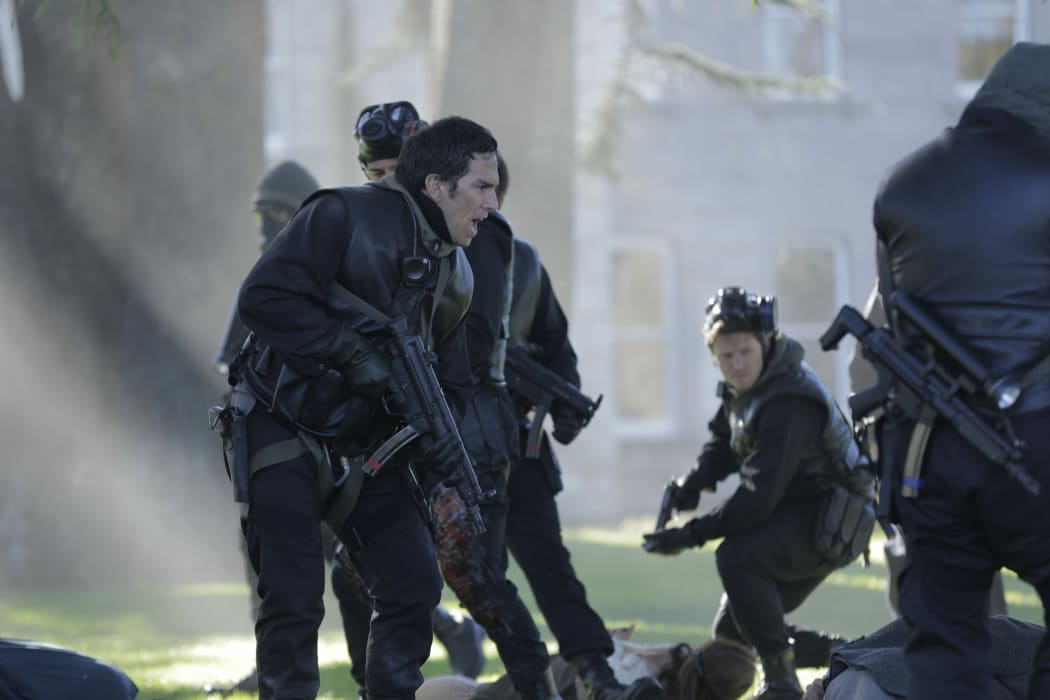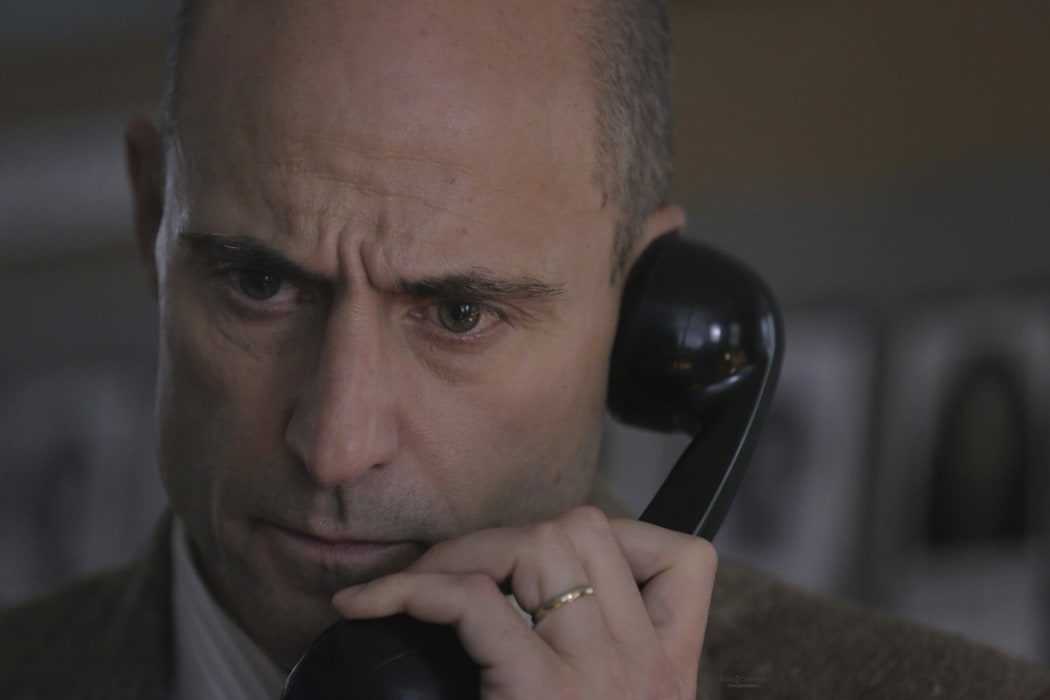For six days in 1980, viewers were glued to TV screens in the UK and around the world watching a dramatic siege at the Iranian embassy in London.
Eventually, the SAS shimmied down the front of the building and blasted out its windows in a bid to free 26 hostages held by an obscure Arab separatist group.
A new film called 6 Days recreates the events.

Max Vernon (wheelchair) talks to actor Mark Strong on the set of 6 Days. Photo: Supplied
The hostages were mostly embassy staff, but also included several visitors and a police officer who'd been guarding the embassy. The SAS rescued 24 of the hostages and five of the six terrorists were shot.
The hostage negotiator who kept the Iranian terrorists talking for six long, tense days, while the plan was devised to free the hostages was Max Vernon (played by Mark Strong in the film).
He tells Wallace Chapman he has always been a persuasive character.
"My biggest weapon has always been, from constable until the last day of my service, I can usually talk most people into doing something and most people out of doing something."
Even his wife says he is a particularly gifted liar.
"If it's going to save somebody I will lie; the trick is not to be caught!"
During the siege, Vernon mostly spoke to one particular terrorist who spoke English – Salim.
"He was a well-educated man, terribly polite, embarrassingly polite from time to time."

SAS move in on the Iranian Embassy in London, 1980 in the film 6 Days. Photo: Supplied
Vernon says his intention was to build a channel of communication – he doesn't attempt to build rapport when negotiating.
"I don't want any rapport with that type of person, what I want is communication. It's a bit of a psychological fencing match. They've got what they think is all the aces, but they actually don't."
One of the secret weapons a negotiator has is the increasing isolation of the hostage takers, he says.
"You reach a stage where they expect that you will do something for them and you will talk to them and they don't talk to anybody else, they become quite reliant on you."
Vernon says he felt he was close to resolving the situation peacefully, until one of the hostages, who he says wanted to be a martyr, pushed the terrorists too far.
"The snag was one of the Iranian diplomats, from the word go, was determined to be a martyr and he had upset them, scrawled insults on the walls, called them all the names under the sun."
The terrorists eventually shot the man.
"From that moment on, it was a different ball game," says Vernon.
He knew Salim was a dead man walking.
"Oh yes, that didn't bother me at all. It might sound cold, but they'd killed somebody and terrorised 26 people – two people died in the assault.
"At that point I knew the SAS were going in but at least I'd given the SAS six days to plan. If they'd gone in on an immediate action plan it would have been very bloody."
Vernon's job then became keeping the terrorists occupied while the SAS made their final assault.

Mark Strong plays Max Vernon in 6 Days. Photo: Supplied
Once the SAS raid was over, the culmination of six days of pressure came to a head, Vernon says.
"The moment the SAS took over I became instantly redundant, I had no further function, and I sat in the corner of the negotiators' room crying. I couldn't stop and I had no idea why I was crying, I wasn't feeling sorry for anybody, I wasn't worried about the SAS, I just couldn't stop crying."
These days his reaction would be understood but less so in 1980, he says.
"The answer is very simple – if you get an elastic band and you wind it and you keep on winding it over and over again then cut it, what does it do? It unravels and that's exactly what I did.
"That was the reason for my tearful episode, I was very ashamed of it I tried to keep it quiet."
Back in 1980, negotiators weren't offered counselling.
"I was back at work the next day with the fraud squad. I should never have driven home, I have no idea how I got there, I don't remember a single inch of the journey. I should never have been allowed to get behind the wheel of a car."
Many believe Vernon played a big part in saving 24 of the 26 lives, through his patient, calm negotiations.
"I've never sought recognition, I did my job as best I could."

